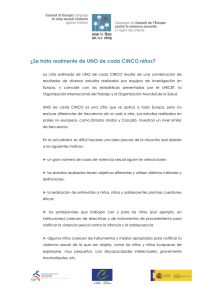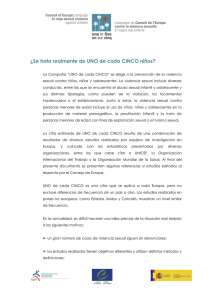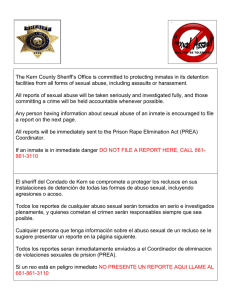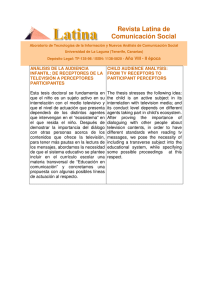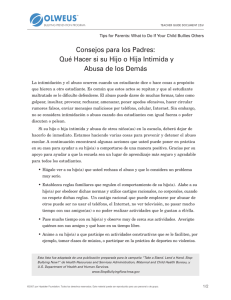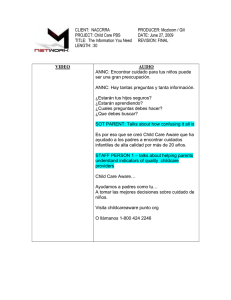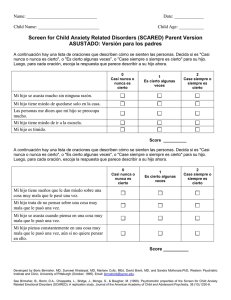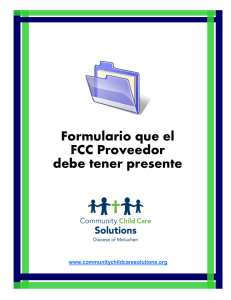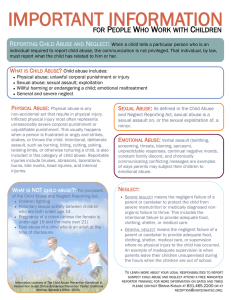Child Abuse Reporting Pamphlet
Anuncio
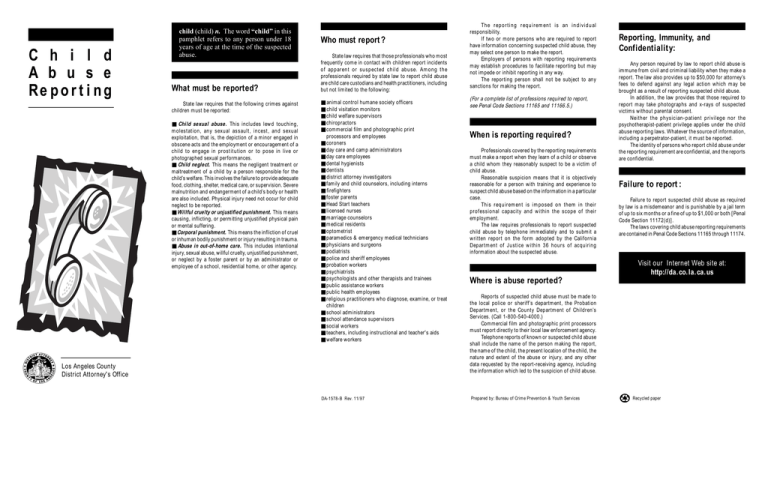
C h i l d A b u s e Reporting child (child) n. The word “child” in this pamphlet refers to any person under 18 years of age at the time of the suspected abuse. What must be reported? State law requires that the following crimes against children must be reported: ■ Child sexual abuse. This includes lewd touching, molestation, any sexual assault, incest, and sexual exploitation, that is, the depiction of a minor engaged in obscene acts and the employment or encouragement of a child to engage in prostitution or to pose in live or photographed sexual performances. ■ Child neglect. This means the negligent treatment or maltreatment of a child by a person responsible for the child’s welfare. This involves the failure to provide adequate food, clothing, shelter, medical care, or supervision. Severe malnutrition and endangerment of a child’s body or health are also included. Physical injury need not occur for child neglect to be reported. ■ Willful cruelty or unjustified punishment. This means causing, inflicting, or permitting unjustified physical pain or mental suffering. ■ Corporal punishment. This means the infliction of cruel or inhuman bodily punishment or injury resulting in trauma. ■ Abuse in out-of-home care. This includes intentional injury, sexual abuse, willful cruelty, unjustified punishment, or neglect by a foster parent or by an administrator or employee of a school, residential home, or other agency. Who must report? State law requires that those professionals who most frequently come in contact with children report incidents of apparent or suspected child abuse. Among the professionals required by state law to report child abuse are child care custodians and health practitioners, including but not limited to the following: ■ animal control humane society officers ■ child visitation monitors ■ child welfare supervisors ■ chiropractors ■ commercial film and photographic print processors and employees ■ coroners ■ day care and camp administrators ■ day care employees ■ dental hygienists ■ dentists ■ district attorney investigators ■ family and child counselors, including interns ■ firefighters ■ foster parents ■ Head Start teachers ■ Iicensed nurses ■ marriage counselors ■ medical residents ■ optometrist ■ paramedics & emergency medical technicians ■ physicians and surgeons ■ podiatrists ■ police and sheriff employees ■ probation workers ■ psychiatrists ■ psychologists and other therapists and trainees ■ public assistance workers ■ public health employees ■ religious practitioners who diagnose, examine, or treat children ■ school administrators ■ school attendance supervisors ■ social workers ■ teachers, including instructional and teacher's aids ■ welfare workers Los Angeles County District Attorney's Office DA-1578-B Rev. 11/97 The reporting requirement is an individual responsibility. If two or more persons who are required to report have information concerning suspected child abuse, they may select one person to make the report. Employers of persons with reporting requirements may establish procedures to facilitate reporting but may not impede or inhibit reporting in any way. The reporting person shall not be subject to any sanctions for making the report. (For a complete list of professions required to report, see Penal Code Sections 11165 and 11166.5.) When is reporting required? Professionals covered by the reporting requirements must make a report when they learn of a child or observe a child whom they reasonably suspect to be a victim of child abuse. Reasonable suspicion means that it is objectively reasonable for a person with training and experience to suspect child abuse based on the information in a particular case. This requirement is imposed on them in their professional capacity and within the scope of their employment. The law requires professionals to report suspected child abuse by telephone immediately and to submit a written report on the form adopted by the California Department of Justice within 36 hours of acquiring information about the suspected abuse. Reporting, Immunity, and Confidentiality: Any person required by law to report child abuse is immune from civil and criminal liability when they make a report. The law also provides up to $50,000 for attorney’s fees to defend against any legal action which may be brought as a result of reporting suspected child abuse. In addition, the law provides that those required to report may take photographs and x-rays of suspected victims without parental consent. Neither the physician-patient privilege nor the psychotherapist-patient privilege applies under the child abuse reporting laws. Whatever the source of information, including a perpetrator-patient, it must be reported. The identity of persons who report child abuse under the reporting requirement are confidential, and the reports are confidential. Failure to report : Failure to report suspected child abuse as required by law is a misdemeanor and is punishable by a jail term of up to six months or a fine of up to $1,000 or both [Penal Code Section 11172(d)]. The laws covering child abuse reporting requirements are contained in Penal Code Sections 11165 through 11174. Visit our Internet Web site at: http://da.co.la.ca.us Where is abuse reported? Reports of suspected child abuse must be made to the local police or sheriff’s department, the Probation Department, or the County Department of Children’s Services. (Call 1-800-540-4000.) Commercial film and photographic print processors must report directly to their local law enforcement agency. Telephone reports of known or suspected child abuse shall include the name of the person making the report, the name of the child, the present location of the child, the nature and extent of the abuse or injury, and any other data requested by the report-receiving agency, including the information which led to the suspicion of child abuse. Prepared by: Bureau of Crime Prevention & Youth Services Recycled paper Reporte el Abuso de Menores Menor (n.) La palabra “menor” en este folleto se refiere a cualquier persona por debajo de los 18 años de edad al tiempo en que se sospecha que ocurrió el abuso. ¿Qué debe ser reportado? La ley estatal requiere que los siguientes crímenes contra la juventud deben ser reportados: ■ Abuso sexual de menores. Esto incluye caricias impropias, molesto, cualquier asalto sexual, incesto, y explotación sexual; esto es, la representación de un menor envuelto en actos obscenos, o el que emplea o induce a un menor para envolverse en prostitución o posar personalmente o fotografiarse en actos sexuales. ■ Negligencia de menores. Esto significa el trato negligente o maltrato de un menor, por una persona responsable de su bienestar. Esto incluye el no proveer alimentos adecuados, ropa, casa, asistencia médica y supervisión. Mala nutrición severa y peligro físico de un menor estan incluidos. No es necesario que ocurran lesiones físicas para que se reporte la negligencia. ■ Crueldad o castigo físico. Esto significa causar, infligir o permitir dolor físico o sufrimiento mental injustificado. ■ Castigo corporal. Esto es infligir castigo corporal inhumano e lesiones resultando en trauma. ■ Abuso fuera del hogar. Esto incluye lesion intencional, abuso sexual, crueldad, castigo injustificado o negligencia de un padre adoptivo o por un administrador o empleado de una escuela, en una casa residencial o en una agencia. Condado de Los Angeles Oficina del Fiscal de Distrito ¿Quien debe reportar? La ley estatal requiere que los profesionales que tienen contacto más frecuente con menores reporten incidentes en que se sospeche el abuso de un menor. Entre los profesionales requeridos por la ley estatal son: ■ agente de control de animales ■ monitor de visitaciónes de menores ■ supervisores del bienestar de menores ■ quiroprácticos ■ empleados y procesadores de la película comercial y fotografía ■ administradores de guardería y campamento ■ empleados de guardería ■ dentistas ■ dentistas de higiene bucal ■ investigadores de la Oficina del Fiscal ■ consejeros de familia y juventud, incluyendo internos ■ bomberos ■ padres adoptivos ■ maestros maestros de “Head Start” ■ enfermeras tituladas ■ consejeros matrimoniales ■ médicos residentes ■ paramédico ■ doctores y cirujanos ■ podólogo ■ empleados de policía ■ trabajadores de libertad condicional ■ psiquíatras ■ psicólogos y otros terapeutas y entrenos ■ trabajadores de asistencia pública ■ trabajadores del bienestar ■ líderes religiosos que diagnostican, examinan o atienden a la juventud ■ administradores escolásticos ■ supervisores de asistencia escolástica ■ trabajadores sociales ■ empleados de salud pública El requisito de reportar es una responsabilidad individual. Si dos o más personas quienes son requeridas de reportar tienen información concerniente a la sospecha de abuso de un menor, pueden seleccionar una persona que haga el reporte. Empleadores de personas que tienen el requisito de reportar pueden establecer procedimientos para facilitar el reporte pero no pueden impedir o inhibir el reportar en ninguna manera. DA-1578-B Rev.11/ 97 La responsabilidad de reportar es individual y la persona que haga el reporte no deberá ser sujeta a ninguna sanción por haber hecho el reporte. (Para una lista mas completa de las profesionesrequeridas para reportar, vea las secciones del Codigo Penal 11165 y 11166.5.) ¿Cuando se requiere reportar? Los profesionales incluidos en esta lista deberán reportar cuando sepan u observan que un niño ha sido víctima del abuso de menores. Este requisito es impuesto a ellos en su capacidad profesional y como parte de su empleo. Una sospecha razonable quiere decir que es objetivamente razonable para una persona con entrenamiento y experiencia para sospechar el abuso de menores basado en una información de un caso particular. La ley requiere que los profesionales reporten sospechas del abuso de menores inmediatamente por teléfono y remitan un reporte escrito en la forma adoptada por el Departamento de Justicia de California dentro de las 36 horas de haber adquirido información sobre la sospecha de un abuso. ¿Dónde se reporta el abuso? Reportes de sospechas del abuso de menores deben ser reportados al departamento de policía, el Departamento de Libertad Condicional o el Departamento de Servicios Juveniles. (Llame al 1-800-540-4000.) Empleados y procesadores de pelicula comercial y fotografía deben reportar directamente a su agencia local de policía. Cuando reportando un abuso conocido o sospechado de un menor por telefono, deberan incluir el nombre de la persona que lo esta reportando, el nombre del menor, donde se localiza el menor, la naturaleza y extensión del abuso o lesiones, y cualquier otros datos que la agencia les pida, incluyendo la información que les guió a sospechar el abuso del menor. Preparado por: Búro de servicíos para la Prevención del Crimen y para la Juventud Reportaje, inmunidad, e confidencialidad Cualquier persona requerida por la ley de reportar abuso de menores es inmune de riesgo civil y criminal cuando hace el reporte. La ley también provee hasta $50,000 de pago a abogados para defender cualquier acción legal que pueda resultar a consecuencia de haber hecho tal reporte del abuso de menores. Además, la ley provee que aquellos que son requeridos de reportar pueden tomar fotografías y rayos equis de víctimas que se sospecha fueron abusadas sin el consentimiento de los padres. Ni el privilegio del doctor-paciente ni el de psicoterapeuta-paciente se aplica bajo las leyes de reportaje del abuso de menores. Cualquiera que sea la fuente de información, incluyendo a perpetradorpaciente, debe ser reportado. La identificación de personas quienes reportan el abuso de menores más los reportes que se hacen bajo el requisito de reportar son confidenciales. Negligencia para reportar: La negligencia para reportar la sospecha de un abuso de menores, que es requerido por ley, es un delito de menor cuantía y es castigado por un término de 6 meses en la carcel o una multa que llegue hasta $1,000 o los dos [Código Penal Sección 11172(d)]. Las leyes que cubren los requisitos de reportar el abuso de menores son contenidas en el Código Penal Secciones 11165 a 11174. Visite nuestra página de Internet al: http://da.co.la.ca.us Papel reciclado
